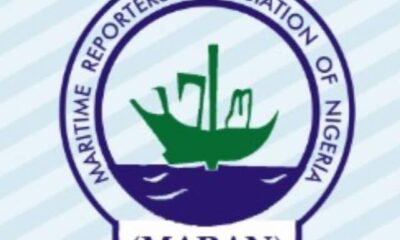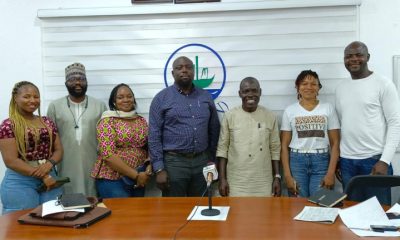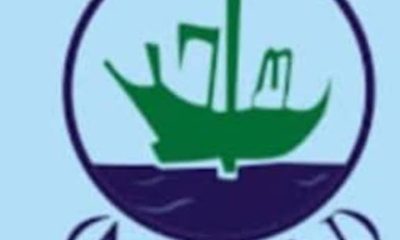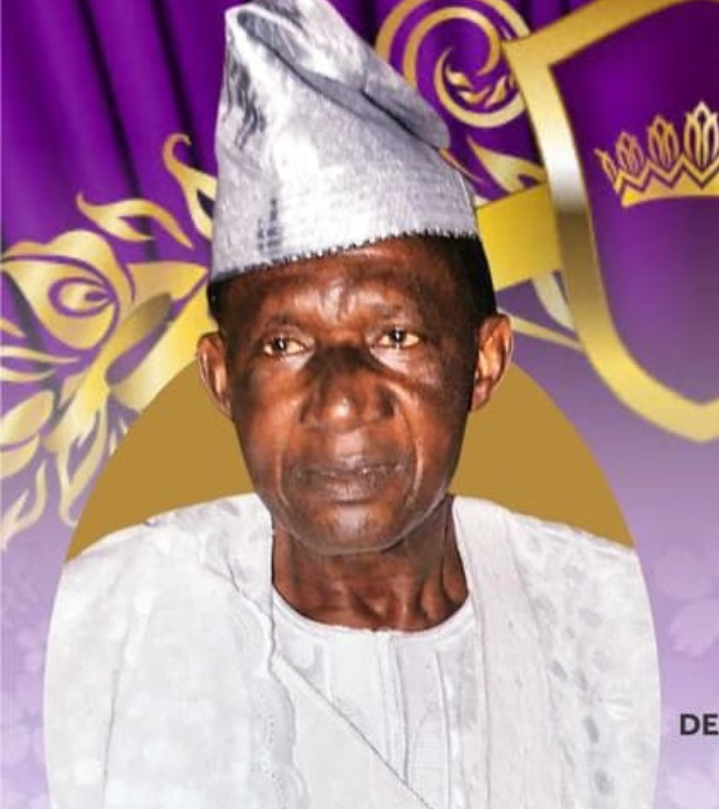Maritime Agencies
INSECURITY IN GoG: Expose and Deal With International Syndicates Now, MARAN Challenges FG
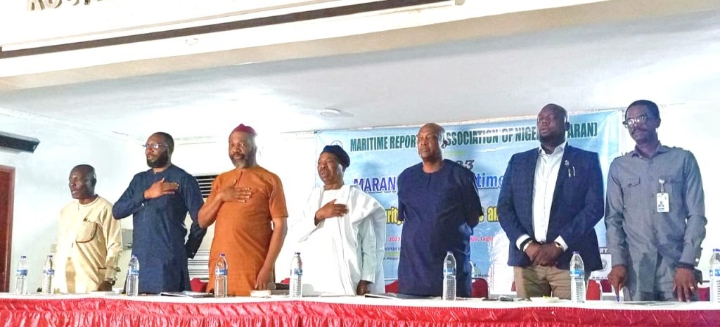
By Izuchukwu Ozoemena
Nigeria’s pioneer maritime journalists’ group, the Maritime Reporters Association of Nigeria (MARAN) has charged the Federal Government to take a second look at strategies on ground to address the nagging problem of oil theft and maritime insecurity in the Gulf of Guinea (GoG) especially at a time achievements recorded in recent years to address the menace appear to be fading away as resurgence is now being witnessed.
MARAN President, Godfrey Bivbere made the call in Lagos, Wednesday, at a one-day MARAN Annual Conference on the theme “Maritime Security: Emerging Threats and Actionable Steps”.
In his welcome address, he pointedly charged Nigeria authorities and other countries in the Gulf of Guinea (GoG) to go back to the drawing board and design more lasting strategies that will ensure that a resurgence of the frightening occurrences is not witnessed, going forward.
“We challenge the Nigeria Government and her regional counterparts to come up with a more workable and result- oriented approach to the fight against maritime insecurity in the GoG. We believe that until and unless the international syndicates involved in the menace are confronted, apprehended and regularly exposed, through international collaboration as often happens with local criminals, the situation will not achieve any purposeful deterrence.
MARAN, he stated, is fully supportive of President Bola Ahmed Tinubu in his wisdom to establish the sector-specific Ministry of Marine and Blue Economy in response to stakeholders’ view that it is one major step to turn around the fortunes of the nation’s maritime domain for the greater good of the economy.
“We envisage that President Tinubu may consider reworking the deterrence clauses contained in the SPOMO Act, to make its intendment more purposeful and business-like.
“MARAN respectfully, wishes to further urge President Tinubu to provide an improved enabling environment for a common and united combat against maritime insecurity through effective harnessing of all available windows, both public and private sector participation.”
Bivbere said MARAN feels deeply pained that since the first half of 2023, piracy has resumed in the GoG. The enormous security threats is a reality the journalists’ body find unacceptable, making her to contribute in whatever way possible to create a public awareness that will ginger the government to design better ways to address a lingering menace.
MARAN, Bivbere said, acknowledge previous and current efforts by the Nigerian Maritime Administration and Safety Agency (NIMASA), Nigerian Navy and their regional counterparts to address issue of piracy and related maritime threats in the GOG. But the body is particularly concerned about the frightening level of crude oil theft in the region beside illegal and unregulated fishing in the GoG by highly-placed international syndicates who enjoy the assistance of local collaborators.
The Federal Government and her counterparts in the region owe everybody the responsibility to rise to the occasion and put a permanent stop to it.
“MARAN is also worried about observed dissonance in the collective national effort to combat maritime economic crimes and crude oil smuggling, and call on the federal government and its relevant agencies to improve on coordination. I want to also especially call on the office of the National Security Adviser to the President, to have a firmer grip and supervision of the existing collaboration between state and non-state actors’ roles, in this regard.
“The International Maritime Bureau, IMB report of July 2023 confirmed that the GoG witnessed a surge in maritime incidents in 2023, with five of such incidents in the first quarter and nine in the second quarter. Out of these, 12 were classified as armed robberies and two as piracy, predominantly targeting anchored vessels within the region. In all the incidents, 14 crew members were kidnapped, out of which 8 were abducted from vessels on anchor. Additionally, in two separate hijacks, 31 crew members were taken hostage, communication and navigation equipment were destroyed, and some cargoes were stolen.”
Speaking at the event, Temi Omatseye, former Director-General of NIMASA observed that many illegal vessels operate on Nigerian waters. He advised that Nigeria should begin to issue ship entry notices to vessels before leaving or arriving at anchor.
“We should know who you are or where you are on Nigerian waters. We must stop playing politics with the shipping industry.”
“We should set up a Restore Zone Transportation Corridor to spot vessels moving in and out of the approved nautical areas. It enables Nigeria to know who is in her maritime territory.”
He emphasized that there is no crude theft in Nigeria. Whatever happens is at the terminals.”
In his intervention, Sesan Onileimo, notable maritime journalist and former President of MARAN attributed majority of issues of crude oil theft and piracy taking place in Nigerian waters to youth unemployment. Onileimo who publishes Shipping Position said that the maritime threats happening in the Niger Delta are rampant and will continue to be rampant as long as the system keeps churning out a large army of able-bodied but unemployed youths who easily become a willing tool in the hands of godfathers who sponsor piracy, crude oil theft and other maritime crimes in the Gulf of Guinea.
He described crude oil theft and piracy as a localized business because people from other geographic areas who are not versed in aquatic business as their counterparts in the Niger Delta cannot make a success when they venture in them.
“There’s a mass of unemployed youths that the society has foisted on us; an idle hand is a willing tool.”
“And I will like to look at this from two angles. There are two categories of unemployed willing youths: the ones trained by NIMASA under its National Seafarers’ Development Programme who were trained, qualified with or without Certificate of Competency (CoC) but waiting to have something to do. They are there, they want to be active, they are the tools that are being used to forment trouble.
“The second leg are those boys and girls who are trained locally, some of them are trained at MAN, Oron, but there are those that are trained even in Agege here who wear uniforms so much so like that of the Navy. They are equipped and recruited into that business that has turned out to be a source of threat to our maritime environment.
“I am saying this because in the course of my years as a maritime journalist, I have had cause to interact with a few of them. If you go to Liverpool here, I am sure the Maritime Workers’ Union will bear me witness; the boys and girls who graduated from Oron, who have turned out to be canoe boys, were not trained in Oron to be handling canoe and boats but there is no job for them. These are the same boys who had five years of training but afterwards, there is no job. Take that guy to Niger-Delta, he is ready to do anything for as long as the money is available”, Onileimo explained.
Adding his voice, Otumba Sola Adewunmi, President, Nigerian Indigenous Shipowners Association, (NISA) advised Nigeria as a country to work hard to have a safe sea where one could sail to wherever he wanted to do his business and safely come back. Adewunmi who suggested putting in place a Nigerian equivalent of the P&I oof Singapore observed that there was so much competition at sea, the equipments are there but with inefficient, uncommitted and inexperienced people to man them.
For instance, he stated,
the Navy’s situation room known as the Falcon Eye, captures and displays everything that happens at sea. But a selfish agenda, he regrets, often lead to inefficiency in job discharge.
“There’s nothing that happens at sea that they don’t see but you will realize that most of our security agents are engrossed with what will come into their pockets. A situation whereby they do everything to their advantage is one of the reasons we are having issues.
“What did Lome have that we do not have in Nigeria?This is the question we should just ask ourselves. These people saw our weakness and made sure that their anchorage was secure. It attracts international operators and they started making money out of it. What is the work of our security agencies? And even when arrests are made, are they not made on frivolous excuses? All these things still go to say what is going to be the benefit to me.
“Until we put the benefit of the nation and what the nation will earn overall, I think we are in a better position to protect our waters very well but this era of entitlement, ‘it is our entitlement, we must get it’, I think it is part of the issues that we have. And as much as these things are there, we will continue to have a higher cost of bringing vessels to this place.”
He opined that if the security agents could work together and there is a good judicial system, Nigeria can achieve a lot.
In his contribution, Capt Tajudeen Alao, President, National Association of Master Mariners (NAMM) stated that maritime crime being a big business whose tentacles spread across the globe cannot be perceived as a Nigerian thing. He advised the participants at the lecture to sit down as a group, brainstorm and come up with workable proceedings that could be presented to the Minister of Marine and Blue Economy to implement.
“Whatever we think is the right thing to do, there must be procedures and guidelines and once the Minister can make subsidiary legislation, it could go a long way in tackling most of these challenges. The trend now is, if you arrest a ship now engaging in illegal bunkering, you blow it up, does it make sense? The air pollution into the sky, the oil pollution into the ecosystem, you have destroyed the fish and periwinkles in that area.
“There are many things that we do. Like my colleague said, you arrest a ship, EFCC doesn’t know how to manage ship. The ship is there, they are waiting for the Police to go to court, the ship becomes a wreck, then, NPA and NIMASA will devote $2 million to salvage a ship that does not worth more than $300,000.”
He insisted that a deliberate action and political must exist before crime can be addressed.
“The Navy”, the NAMM boss continued, “cannot afford to fund maritime security just as it cannot afford to keep the ships at sea with the budget within its disposal”.
“It finds it comfortable relying on the Nigerian Maritime Administration and Safety Agency, (NIMASA) to fund most of its operations”.
Maritime Agencies
Customs Bans Stemming of Containers of Pharmaceutical Products To Bonded Terminals, Hands Over N9.2bn Illegal Importations To NAFDAC
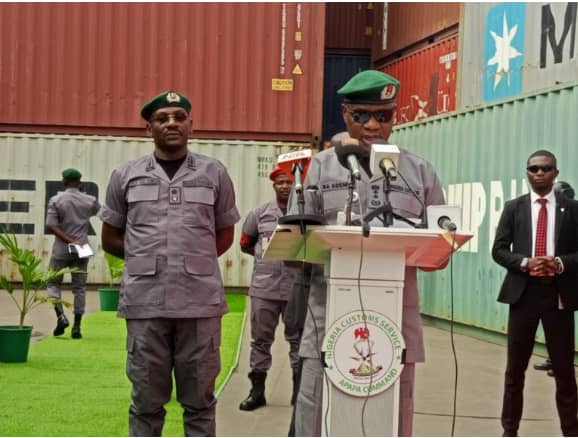
By Izuchukwu Ozoemena
Going forward, the Nigeria Customs Service has placed an indefinite ban on the stemming of containers of pharmaceutical products to bonded terminals. This is official.
Customs Controller-General, Bashir Adewale Adeniyi announced this in Lagos, Friday, in response to what he referred to as abuses and trade illegalities being perpetrated by offdock facilities.
”We will no longer allow stemming vessels down into offdock facilities. We can allow any other thing but because of the sensitive nature of pharmaceutical products and because of the abuse to which this concession has been subjected in the past, they will only be allowed or cleared in these four designated places: Apapa Port (right inside the port), Onne Port, PTML and at the International Airport. We’ll no longer allow them to be taken into bonded terminals.”
The Controller-General who was in Apapa to hand over 25 containers of unregistered and prohibited pharmaceutical products with a Duty Paid Value (DPV) of N9.2 billion to the National Agency for Food and Drug Administration and Control (NAFDAC) declared the aim of the restriction. This is to curtail the abuse by bonded terminal operators, many of whom have been implicated in the seizure of fake and unwholesome drugs.
CGC Adeniyi described the seizure of pharmaceutical products as a direct fallout of the strategic Memorandum of Understanding with NAFDAC and the inauguration of the implementation committee between the two bodies in November 2024.
Explaining the Service’s position regarding current licensing fees, he stated that the current licensing fees for bonded terminals in operation stand to be reviewed as they no longer align with current realities, haven been in place for about a decade.
”The increase in the fee of the license has to be such that it will be difficult or impossible for those who are not serious to own and operate a bonded terminal.
”So, we are already in the process of reviewing the license fee. We will carry the stakeholders along and do things that will reflect current situations”.
He acknowledged the role inter-agency collaboration and intelligence-sharing have continued to play in enforcement.
This enhanced cooperation has delivered measurable results in protecting public health and discouraging illicit trade.
”The MOU framework enables Customs and NAFDAC to conduct coordinated operations and joint investigations, systematically tracing illicit pharmaceutical sources and deploying targeted enforcement strategies against criminal networks”.
A rundown of the contents of the
21 forty-foot containers and 4 twenty-foot containers of counterfeit and dangerous pharmaceutical reveals unregistered sexual enhancement drugs like REDSUN and HYEGRA among others.
There are also codeine-containing cough syrups (including CSC brands), antibiotic injections such as oxytetracycline and artesunate, pain relief medications containing diclofenac sodium and paracetamol.
Also included are skin-lightening creams, hip and breast enlargement products and
numerous tablets bearing fake NAFDAC registration numbers. Expired food products, veterinary medications and antimalarial drugs also featured.
“The Nigeria Customs Service, in partnership with NAFDAC and the NDLEA remains uncompromisingly committed to the battle against merchants of death who pursue illicit profits from businesses that destroy lives and communities,” Adeniyi stressed.
“This MOU- facilitated coordination enables swift responses to emerging threats, and I commend the Director-General and her dedicated team whose technical expertise, combined with our enforcement capabilities, has created a formidable barrier against criminal networks seeking to compromise our borders”.
“Under the coordination of the Office of the National Security Adviser, our joint operations have resulted in the seizure of over 200 containers followed by coordinated destruction exercises, with unregistered pharmaceutical products comprising 63.7% of seizure values, highlighting the scale of threats that could have inflicted devastating damage on human lives and our social ecosystem if permitted to infiltrate our markets,” he stated.
Adeniyi who emphasized that the Service has significantly enhanced her intelligence network and technological capabilities to detect and seize unwholesome goods warned all stakeholders including haulage operators, bonded terminal owners, or any other international trade facilitator that anyone implicated in illegality stands to face the full force of the law as there are no sacred cows.
He commended commended officers and men at the Apapa Port Command for being vigilant and professional in their duties.
Maritime Agencies
Lekki Deepsea Port Set To Clinch 500,000 TEUs, Becomes Trans-shipment Hub In West Africa
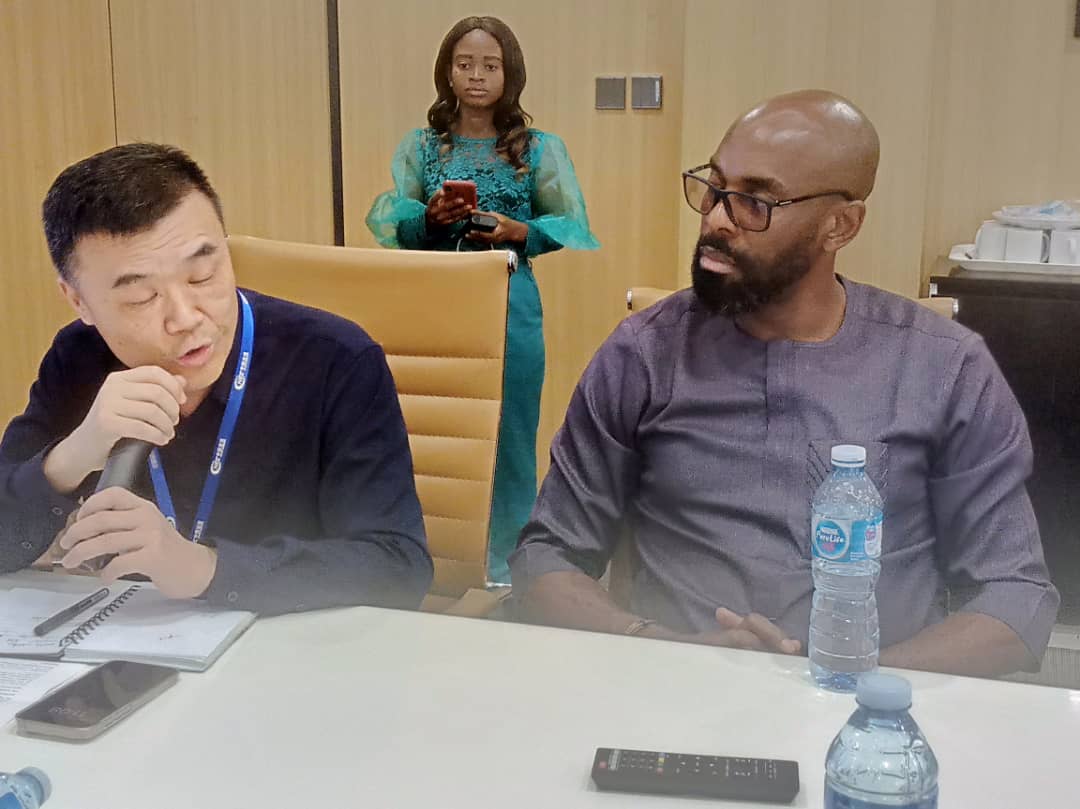
By Izuchukwu Ozoemena
Yang Xixiong, the Chief Operating Officer, Lekki Port has said the deepsea port which commenced operations in 2023 has come to place Nigeria in her rightful position as a shipping hub that has assumed her rightful position and relevance in regional and global economy.
The CEO who disclosed this in Lagos,Thursday, while rubbing minds with members of the press assured that the new port has stabilized and would, going forward,continue to raise the bar of relevance to international standards.
“We continue to push the envelope, set the bar higher to uphold our position as West Africa’s deepest sea port,” Xixiong announced.
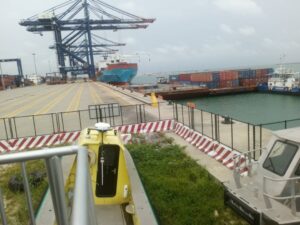
A section of critical facilities at the Lekki Deepsea Port.
“The result of our unrelenting commitment to world-class standards is visible in the gigantic footprints we are putting on the map of maritime trade in Africa, deploying technology, driving operational efficiency, and shaping regional trade,” he added.
Already, Lekki Port has commenced trans-shipment operations to some regional ports in West Africa such as Togo, Ghana and Côte d’Ivoire.
In his intervention, Daniel Odibe, Deputy Chief Operating Officer, who spoke further on the increase in trans-shipment capacity added that recently, Lekki Deepsea Port conducted a trial trans-shipment to Onne Port.
Odibe said, “We had our first trans-shipment operations in 2023, which is the first in the Nigerian economy.
Between January and June, 2025, the port processed 222,000 Twenty-foot Equivalent Units (TEUs) of cargo and has her hands steadily on the plough to jerk up the performance so as to achieve the targetted record of 500,000 TEUs by the end of the year, a development that reflects a growing confidence in the port’s ability to achieve maximum operational capacity as per international standards.
“Before now, countries like Togo, Ghana, and Côte d’Ivoire used to be the trans-shipment hubs for Nigeria-bound cargoes. You know what that means for our cargo? They spend more time coming to us. They incur more costs because they are double-handled in those trans-shipment hubs, all because Nigeria didn’t have a deep-sea port.
”The story is in our favour right now. We are now talking about international trans-shipment. We are now doing international trans-shipment to other West African countries such as Ghana, Côte d’Ivoire, Abidjan, Togo and Cotonou.
”Currently, you have ports like Warri, Calabar, Onne, and then we have inland ports like Onitsha and Burutu. Some of these ports, foreign vessels don’t go there because the draft is low. So the idea here is to have cargoes for those ports. That will open up economic opportunities in those areas.
“We did some trials last year with Onne. It had some challenges, but again, it was an eye-opener and we are looking at restarting that again this year in collaboration with the shipping lines and baggage operators.”
On cargo throughput volume, Odibe assured that cargo volumes are now gradually improving steadily despite initial hiccups arising from instability in the rate of the Dollar.
Currently, the port receives between 10-12 vessels every month. The record, he added, is steadily picking up.
“Volumes fell because of Naira depreciation and the removal of fuel subsidy; this caused a setback in our projection. As of 2023, when we started operations, we did 54,289 TEUs, and as of June of this year, we have done 222,000, and we are projecting 500,000 TEUs.”
Odibe also stated that the vessel turnaround time at Lekki Port currently stands at 48 hours as against one hour and 25 minutes for truck turnaround time, while cargo dwell time is 16 days.
Maritime Agencies
MAMAL 2025: MARAN Demands End to War Risk Premium, Set to Expose Maritime Fraud in Gulf of Guinea.
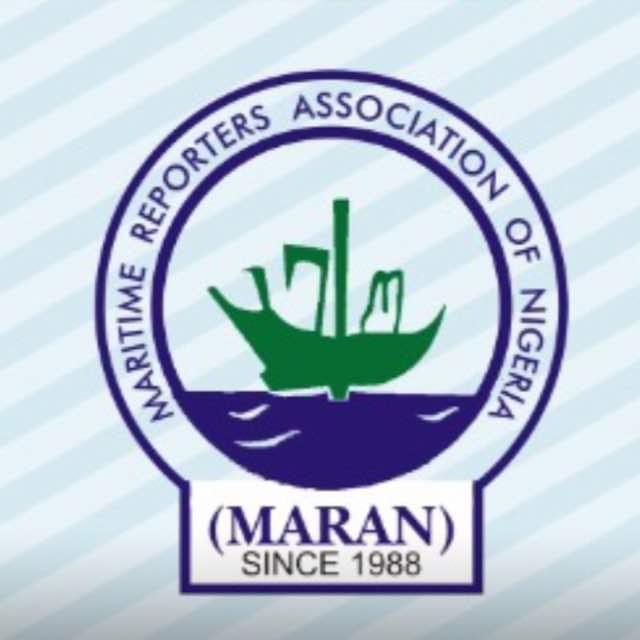
By Izuchukwu Ozoemena
Come August 28, 2025, the Maritime Reporters Association of Nigeria (MARAN) will host the 3rd edition of her annual Maritime Lecture (MAMAL) at the prestigious Eko Hotel and Suites, Lagos.
This year’s lecture will spotlight the ongoing international fraud perpetrated by foreign shipping lines under the guise of “War Risk Premiums” on vessels calling at Nigerian ports, aiming to draw the Federal Government’s urgent attention to the issue.
Speaking on the theme of MAMAL 2025 which is “Addressing the Burden of War Risk Insurance on Nigerian Maritime Trade,”MARAN President, Mr. Godfrey Bivbere, strongly condemned the war risk insurance, describing it as an international fraud burdening the economy of Nigeria and other developing countries in the Gulf of Guinea.
The extra war risk insurance (WRI) levied on Nigeria-bound vessels varies significantly. For instance, a very large crude carrier (VLCC) can incur a WRI surcharge of $445,000 per voyage, while a new container vessel may face a charge of $525,000 per voyage. Beyond this, some shipping companies such as Maersk, have introduced additional fees like a transit disruption surcharge, while others impose a war risk surcharge of $40-$50 per 20-foot container.
MARAN contends that these exorbitant charges are further strangulating Nigeria’s already-strained economy.
Also, despite Nigeria’s Minister of Marine and Blue Economy, Adegboyega Oyetola recently confirming that Nigeria has not recorded a single pirate incident in the past three years, the imposition of war risk premiums continues unabated.
Oyetola credits this peace in the Gulf of Guinea to the multi-billion naira Deep Blue Project, a robust maritime security initiative spearheaded by the Nigerian Maritime Administration and Safety Agency (NIMASA).
Despite these commendable efforts by the Federal Government, MARAN is concerned that foreign shipping lines continue to unjustly extract millions of dollars from Nigerian shipowners in the name of War Risk Insurance Premium, even though there are no demonstrable risks in the region.
In March 2025, Dr. Dayo Mobereola, Director General of NIMASA, met with a delegation from the Danish Ministry of Foreign Affairs, led by Kristin Skov-Spilling, where he passionately appealed to the international community to acknowledge Nigeria’s significant progress in securing its waters. He emphasized the critical need for a corresponding reduction in war risk insurance costs.
Dr. Mobereola stated, “The Nigerian government has demonstrated a strong commitment to maritime security, leading to nearly zero incidents of piracy and armed robbery in the Gulf of Guinea over the past four years. Despite this, vessels coming to Nigeria continue to pay high war risk premiums, which is unjustifiable given the improved security landscape.”
Speaking further on the upcoming MAMAL Annual Maritime Lecture 2025, MARAN President Godfrey Bivbere asserted that international shipping companies operating in Nigeria have shown “lackadaisical and complacent attitude towards the economic and social wellbeing of Nigeria as a nation.”
He explained that MAMAL 2025 aims to thoroughly examine the perceived threats, realities, and profound implications of persistent Extra War Risk Insurance (EWRI) on Nigeria’s maritime trade and the wider Gulf of Guinea (GoG).
Providing more details about the highly anticipated conference, which has consistently served as a crucial rallying point for all maritime stakeholders due to MARAN’s respected voice, Bivbere added:
”The Summit will also explore issues leading to the classification of the nation’s waters as high-risk zones, roles of classification societies like the Lloyds of London, the roles of core stakeholders like NIMASA, Nigerian Navy and other maritime and security operators.”
According to Bivbere, “The MAMAL 2025 is expected to draw over 500 key stakeholders, including maritime security experts, shipowners, terminal operators, international shipping lines, diplomats, insurers, regulators, and legal experts.”
-
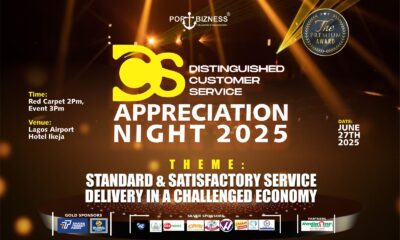
 Maritime Agencies2 weeks ago
Maritime Agencies2 weeks agoPORTBIZNESS Celebrates Excellence in Customer Service Delivery, Holds Special Awards Night
-

 Maritime Agencies3 weeks ago
Maritime Agencies3 weeks agoKebbi Customs Command Introduces Health Screening, Mandatory Sports To Ensure Work-life Balance
-
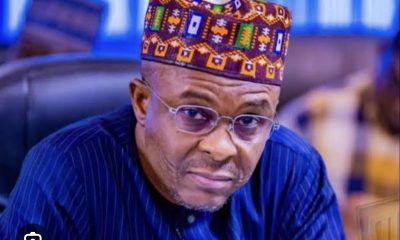
 Maritime Agencies1 week ago
Maritime Agencies1 week agoNPA Berths Nigerian-Owned Container Vessel,”MV OCEAN DRAGON,” To Boost Incountry and Regional Trade,
-
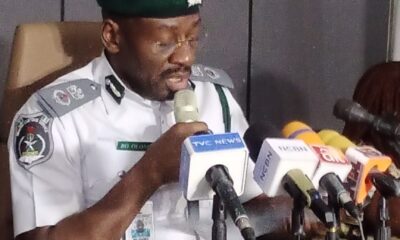
 Maritime Agencies3 days ago
Maritime Agencies3 days agoApapa Customs Revives Rail Haulage of Cargo, Shuts Three Bonded Terminals
-
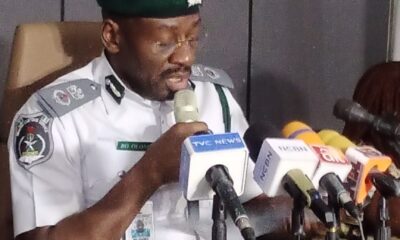
 Maritime Agencies1 week ago
Maritime Agencies1 week agoHALF-YEAR REVENUE DISPOSITION: Apapa Customs Hits N1.38Trillion, Confiscates Prohibited Goods Worth Billions.
-
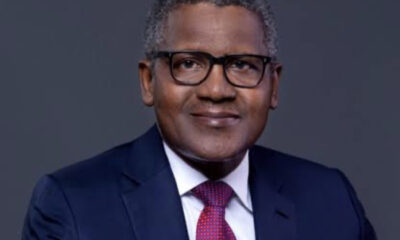
 Maritime Agencies4 days ago
Maritime Agencies4 days agoDangote Lauds NPA’s One-Stop Shop Committee, Donates Coaster Bus To Ease Operations
-
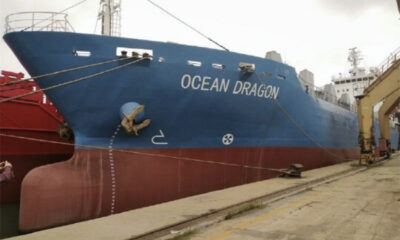
 Maritime Agencies1 week ago
Maritime Agencies1 week agoNIGERIAN PORTS AUTHORITY BERTHS FIRST WHOLLY NIGERIAN-OWNED CONTAINER VESSEL.
-
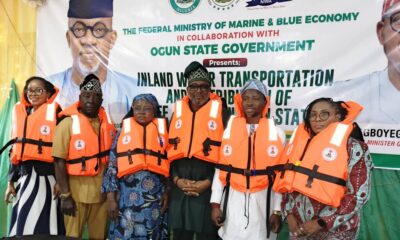
 Maritime Agencies3 days ago
Maritime Agencies3 days agoSAFETY ON WATER: FG Donates Life Jackets To Ogun State Government, Emphasizes Safety


